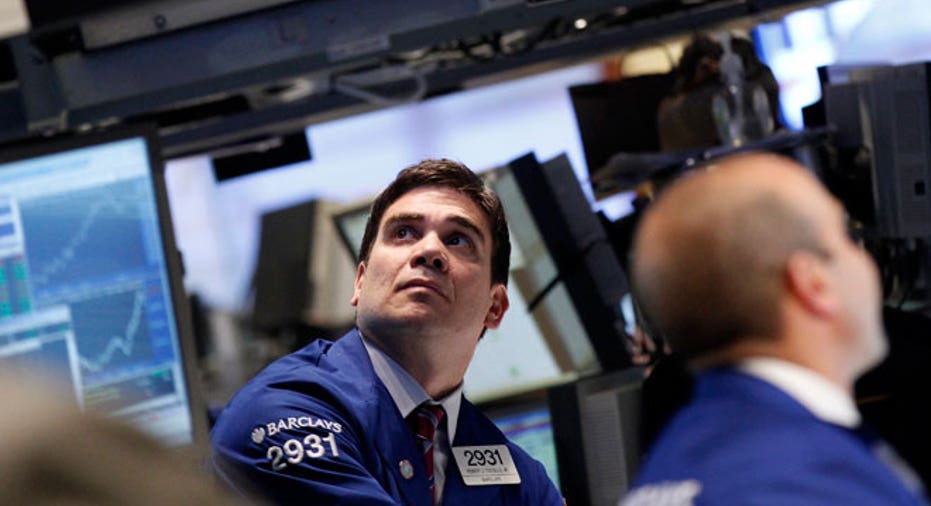Stocks Retreat in Broad, Euro-Fueled Selloff

FOX Business: The Power to Prosper
Wall Street pulled back sharply on Wednesday in stark contrast to the big gains seen in the prior session as traders were once again forced to grapple with the specter of the eurozone's debt debacle bleeding into core nations.
Today's Markets
The Dow Jones Industrial Average fell 161 points, or 1.3%, to 12420, the S&P 500 dipped 19.1 points, or 1.4%, to 1313 and the Nasdaq Composite slid 33.6 points, or 1.2%, to 2837.
The selling was fierce on the day, with trades in advancing shares outpacing those in declining shares by more than 11-to-one. As a result, traders fled to the protection of safe-havens, such as U.S. Treasury bonds. Indeed, the yield on the benchmark 10-year note tumbled 0.104-percentage point to 1.627% -- the lowest since at least 1977.
Volatility, meanwhile, lurched higher by more than 11% as tracked by the CBOE's VIX. Energy shares struggled the most on the day by far on the back of a rout in oil markets that knocked crude to its lowest level since October 2011. Other economically-sensitive sectors, such as financials, industrials, basic materials and consumer discretionary shares, all took a thrashing as well. Traditional defensive plays like health-care and utility stocks held up the best, but still fell.
Spain Takes Center-Stage as Europe's Debt Crisis Heats Up
In yet another sign that the eurozone's debt crisis is spreading from periphery nations straight into the currency bloc's core, market participants were focused squarely on Spain. The Financial Times reported late Tuesday that the European Central Bank was considering a move to block Spain from recapitalizing ailing lender Bankia on legal grounds.
The ECB issued a brief statement on Wednesday, saying contrary to the report, it has not been consulted on the matter. However, the damage had already been done, adding more uncertainty to the already fragile situation. The yield on Spain's 10-year bonds recently traded at 6.63%, close to euro-era highs. That represents a 5.3-percentage point premium to the yield traders pay to hold safe-haven German Bunds.
A statement from the European Commission that the bloc's permanent bailout fund, called the European Stability Mechanism, may be able to directly recapitalize banks helped global markets and the euro claw their way back from session lows.
The common currency fell 0.43% to $1.2449, while the Euro Stoxx 50 dipped 2%. The IBEX 35, which is Spain's benchmark stock-market index, fell 2.6%.
On the Asian front, Xinhua, China's official news agency, suggested the country won't act to stimulate the world's No.2 economy. There have been worries that the rate of expansion might cool down quickly in what is referred to as a "hard landing" that could reverberate across other large economies.
Adding to the gloomy sentiment on the day, a housing-market indicator came in considerably weaker than expected. Pending sales of previously-owned homes dropped 5.5% in April from the month before, the National Association of Realtors reported. Economists expected a 0.1% gain. However, sales are up 14.4% from year earlier levels.
Commodities were under pressure on the back of a weaker euro and the global concerns that were weighing on equities. The benchmark crude oil contract traded in New York sold off by $2.94, or 3.2%, to $87.82 a barrel. Wholesale New York Harbor gasoline slid 1.7% to $2.86 a gallon.
In metals, gold rose $14.70, or 0.95%, to $1,566 a troy ounce.
Foreign Markets
The Euro Stoxx 50 fell 2% to 2116, the English FTSE 100 sold off by 1.7% to 5297 and the German DAX slid 1.8% to 6281.
In Asia, the Japanese Nikkei 225 dropped 0.28% to 8633 and the Chinese Hang Seng tumbled 1.9% to 18690.



















